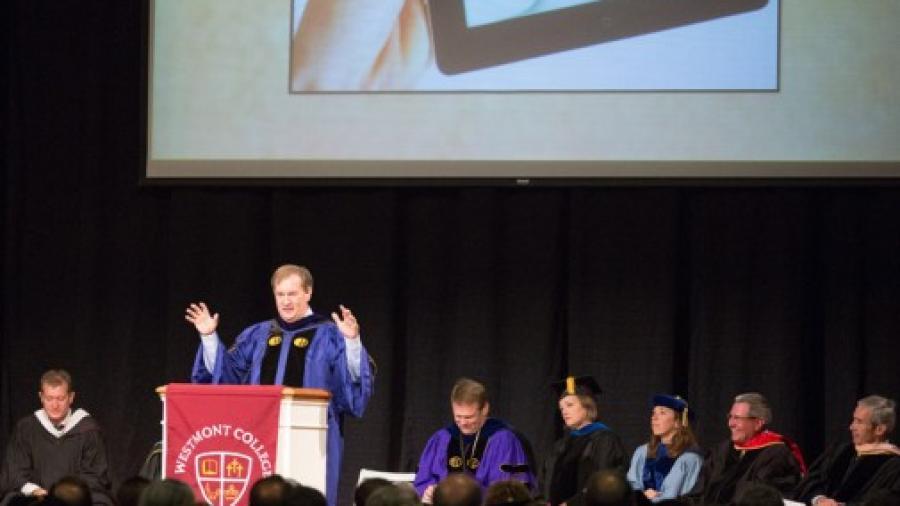Westmont Magazine Awakening the Moral Imagination

Faculty celebrated Provost Mark Sargent’s installation by thinking about how our faith equips us to bring imaginative solutions to current and future ills.
Niva Tro, Chemistry
The confluence of the push for STEM (science, technology, engineering and mathematics) education and the technology to do it more cheaply provides some opportunities to invoke moral imagination. The major focus of such education is largely utilitarian: so our economy can produce more goods and services and compete on the world stage. What is missing is the value of scientific understanding for its own sake. Many of the major triumphs of science have been the result of men and women who valued knowing about the world around us.
Linus Pauling, a Nobel Prize-winning chemist said, “I feel sorry for people who don’t understand anything about chemistry. They are missing an important source of happiness.”
The part of science that enriches our lives through the understanding of our world is lost on many people today because we have this narrowly utilitarian view. Unfortunately, the push for STEM seems to only exacerbate the problem and may be responsible for the apathy toward science that has created the STEM crisis. If the point of science is just to make a better shampoo or a more durable plastic, then why should I care to learn it? Let someone else do it. Maybe this is why a large fraction of Americans would rather clean a toilet than solve a math problem. The inherent value of understanding science and math has been lost. Maybe it is time to engage the moral imagination to counter that trend.
Tremper Longman III, Religious Studies
Christian tradition acknowledges God’s revelation in the Bible as canon, the standard of faith and practice, and therefore the ground or perspective through which we are to think about the solutions to today’s problems and issues. However, the Bible does not simply provide direct statements that address today’s problems. Don’t get me wrong; it does provide some very direct statements, such as the Ten Commandments. The case law in the Old Testament takes the principles of the Ten Commandments and applies them to specific situations according to the sociological and redemptive historical context of the people of God at the time. For example, Deuteronomy requires building a fence around your roof, which was a living space, as a way of protecting life. In one sense, case law is an act of the imagination, applying the principles of the Ten Commandments.
Within the Bible itself we see development in its moral vision on such issues as food, women, slavery and sexuality—the first three becoming more open, with the latter being more restrictive (divorce is harder and polygamy is discouraged). Thus, the Bible provides a moral vision that calls on us to use our sanctified intellect and imagination in applying its statements to our contemporary context. I suggest that the Bible’s term for moral imagination is wisdom, the ability to interpret the ancient text, read the modern situation and understand ourselves as we wrestle with the moral and social troubles of today.
Jane Wilson, Education
Recently, I discussed teaching as a possible career at a local junior high and quoted Albert Einstein, “It is the supreme art of the teacher to awaken joy in creative expression and knowledge.” I asked the students to write down what teachers could do to awaken their creative expression and curiosity in ways that helped them make wise, moral decisions. Not surprisingly, they shared some poignant wisdom: Take a day off from worksheets; Tell stories of people to inspire us.
Rather than imagining flipped classrooms, textbooks on iPads with videos replacing images, or the rising rigor and relevance of the new Common Core Standards, I took inspiration from these students and from Frederick Buechner. He wrote, “It is precisely through (sharing) our stories in all their particularity . . . that God makes himself known to each of us most powerfully and personally . . . to lose track of our stories is to be profoundly impoverished not only humanly but also spiritually.”
Here’s one story. When I began my doctoral studies, my mind was spinning with questions about education. My dissertation adviser helped me focus my intellectual curiosity in a gruff and commanding voice. “Enough with all the questions,” he barked. “Where is the fire in your belly?” I began to recognize that I cared deeply, even passionately, about how teachers can structure learning to promote intrinsic motivation to learn. Our passion for focused intellectual curiosity lies within our heart, mind—and maybe our belly.
Read the unedited text by all nine professors at http://www.westmont.edu/_offices/provost/provost-report/archive/nov12/moral-imagination.html